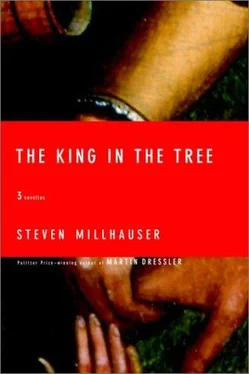He knew that Georgiana was aware of the change in him, for by dozens of small signs she revealed an uneasiness in his presence, a new alertness, that in another woman might have been the first sign of awakened interest. In Georgiana he detected only a desire to conceal herself more completely, to evade scrutiny. Don Juan was accustomed to the ambiguous smiles, the modest withdrawals that were secret advances, of women who agreed to the rules of the game. Georgiana simply eluded him. He understood that if she eluded him, it was because she was aware of him — but her awareness went only far enough to enable her to mark out her distance. She wasn’t unfriendly. What troubled him was that she wasn’t anything in particular. She was a little playful, a little watchful, a little distrustful, a little indifferent. She hadn’t missed him; she did not need him; and as the days continued, it seemed to him that he had failed utterly to capture her innermost attention.
One morning after an exhausting night, when he had lain awake until dawn and then fallen into a restless half sleep, Juan hurried down from his room and found Mary seated in the drawing room. She was alone. Looking around wildly at the empty room, the desolate symbol of still another departure— this time she had left secretly and cruelly, without a word to anyone — Juan strode forward as Mary drew back and cried, “What is it? What is it?” as if he had struck her in the face like a madman. Juan stopped, looking with surprise at his hand gripping his sword hilt and at the frightened face of Mary Hood.
“Pray pardon me, but you — surprised me,” he said.
“Good heavens! One would think you had seen — I don’t know what. Georgiana asked me to tell you that she is writing letters in her room and will be down in five minutes.”
A feeling of tenderness seized Juan at the thought of Mary waiting for him so that she might deliver Georgiana’s message. It was a message that itself showed unusual consideration, since anyone who wished such a message to reach him must have imagined his feelings of confusion and concern, and with deep sincerity he said, “Forgive me if I frightened you.” Instantly a thought seized him and he added, “But you’re certain she asked you to tell me? She might have said, ‘I’ll be down in five minutes.’ And you changed her words into ‘She told me to tell you.’ Can you remember whether she said, ‘Please tell him that I will be down in five minutes’? Do you recall her exact words?” And although an instinct warned him that he ought to stop talking immediately, that he was acting like a man who no longer respected himself, at the same time it seemed to him that if only he had the answer to this question, then his mind would be at peace and he could return to the calm, soothing routine of Swan Park.
In his effort to gain Georgiana’s attention — her deepest, most inward attention — Juan found himself turning to Mary. She was always there, waiting for him to look at her, watching his face, alert to his slightest ripple of feeling. She would exchange conspiratorial glances with him when Georgiana’s head was turned, fall back with him on the path, leave an empty place beside her whenever the three of them rested on the elaborately carved seats and benches disposed along the walks, watch for the moment when he wished to say something to her in a few whispered words, such as “If we can get her to take that turn, over there,” draw him into the conversation or take up the slack when he chose to be silent. Juan was grateful to Mary, though he understood that her devotion to his cause was not disinterested: what she craved wasn’t his success with Georgiana but her own intimacy with him. Juan was used to the adoring looks of women, and if he accepted Mary gratefully, it was also without surprise.
She had taken to slipping him notes from time to time. He would open a morocco-bound copy of Warner’s Horticultural Meditations, brought to him by Mary from the library to improve his command of English, and in it he would discover a folded piece of letter paper on which she had written:
Tomorrow morning we should take the west path, past the plum orchard, in the direction of the grotto. After the wych elm, let us bear left, through the pine grove, which will take us to the cascade — a lovely walk, with many enchanting prospects, and one about which Georgiana spoke with enthusiasm last summer.
His slight irritation at the note, with its air of whispered melodrama, dissolved at the thought of the next day’s walk, with its new turn through the pine grove, shot through with dim green sunlight, which would ripple across her hands and throat as if she were composed of iridescent silk — and as he reread the note, which promised him an intimacy so necessary to his well-being that he tried not to desire it, in order not to suffer disappointment, suddenly he came to the words “last summer,” that time when she walked in Swan Park without him, and it seemed to Juan that she had always walked through rippling sun and shade in a green world beyond his world, maddening and ungraspable.
Or, walking along the path of osiers, Juan would feel something brush against his hand. Glancing down he would see Mary’s hand passing him a piece of paper, which he would thrust out of sight and read later, in his sitting room: She says you are too silent.
Once, when he was walking with Mary behind Augustus and Georgiana on the path by the Ymber, he was startled to see Georgiana’s hand, in its yellow kid glove, reach behind and lightly lift up the back of her hooped overskirt, in order to prevent the hem from catching on a small branch that had fallen onto the path. The suddenly appearing hand, the agile jerk of the wrist, the exposed ankle with its tense tendon pressing against the white silk stocking, the sense of a secret and exact body inhabiting the shaking mass of her clothes, all this created in Juan a roaring behind his eyes, as if he had accidentally stepped off the path into the thick mist of a cascade, so that he was almost relieved when, a few moments later, he caught his foot on the small branch, which he kicked violently aside. Georgiana, glancing over her shoulder from under the turned-up brim of her bergère hat, looked down at the branch, raised her eyes to Don Juan’s face, and seemed about to say something, before she turned away with a faint smile.
From Mary he learned that Georgiana had had several suitors, whom she had discouraged swiftly. She passed her time between her father’s house and Swan Park, and seemed disinclined to pant after a husband. When Mary and Augustus traveled, Georgiana accompanied them. Augustus, Mary observed, was good to her sister, though she added without complaint that Georgiana in her own way was helpful to him, for Augustus worried about leaving Mary too much alone and the presence of Georgiana permitted him to do as he liked. Mary, Juan saw, was cleverer than he had thought. He tried to imagine her life, and the life of Georgiana, but quickly grew tired — he wasn’t in the habit of imagining the invisible lives of women. If Georgiana puzzled him, it wasn’t because of the way she conducted her life, which seemed to him no more absurd than the lives of other women — it was because she drifted before him, just out of reach, glancing over her shoulder with a little smile, like a faery creature from another world who was leading him deeper and deeper into a dark forest.
Sometimes he rebelled against his new life — a life of continual agitation and anxious brooding modified by moments of uncertain hope. Hadn’t he always despised men of feeling? — the soft, delicate, sighing race of men who go trembling after a woman. After all, he was no dreamer. He was Don Juan Tenorio, scorner of gods, slayer of men, conqueror of women — a new Alexander, obeying no law except the law of his relentless will. What was wrong with him? He was no longer himself — he was no longer anything. He was a sick man — a dying man — a man who had been poisoned by a woman. Enough! It was time to act. She was nothing — nothing but a woman — and she would bend to his will — or break. He had known plenty of Georgianas— proud women, arrogant women, enclosed in the insufferable circle of their self-esteem. He had had one of them against an orchard wall in Algeciras, another on a drawing-room sofa in Seville, with his hand over her mouth. She had bitten him like a rat. He would have her — she would pay attention to him— he would smash his way in. Then an image would come to him, of sunlight and green shade, of a cool smile and a glance thrown across a river, and Don Juan would suddenly place a hand on his chest, as if to feel his adoration spreading in him like a disease.
Читать дальше












